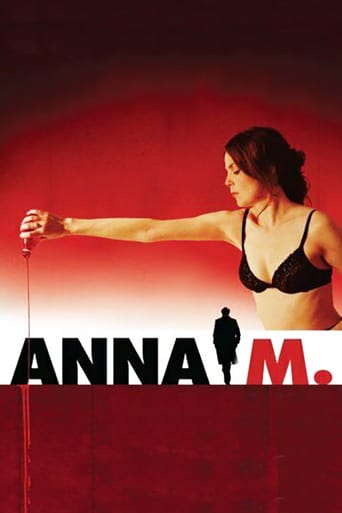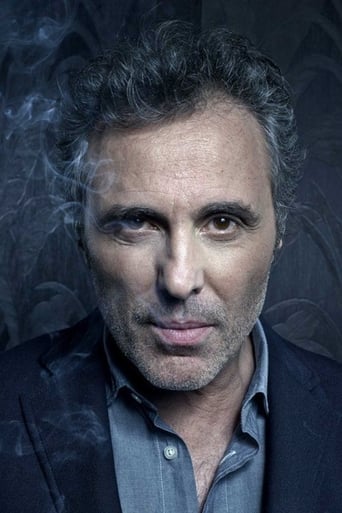

Anna M. (2007)
Anna, a somewhat introverted woman, becomes obsessed with the orthopedic surgeon who helped with her recuperation following a car accident. Incorrectly believing the love to be reciprocated, she embarks on several attempts to try and stay in touch with him but, after several rejections, finds herself descending into despair and, ultimately, hatred.
Watch Trailer
Cast
Reviews
If you don't like this, we can't be friends.
The acting is good, and the firecracker script has some excellent ideas.
There is definitely an excellent idea hidden in the background of the film. Unfortunately, it's difficult to find it.
It’s fine. It's literally the definition of a fine movie. You’ve seen it before, you know every beat and outcome before the characters even do. Only question is how much escapism you’re looking for.
'Anna M.' is a stylish, chilling portrait of a woman's collapse into mental illness; yet it's only partially successful as a film, in spite of a great performance from Isabelle Carre in the lead role, excellent cinematography and an understated, effective score. This is partially because at times it threatens to descend into a straightforward psychopathic stalker movie, and however nicely this is worked out, it's a plot line made dull through over-use and the fact that the victim, by definition, cannot be held responsible by the viewer for their actions. In my opinion, most interesting films leave the audience to judge the character, which can't be done with this plot line. Cleverly, the film cleverly brings this sub-plot to a premature climax, which turns out to be just a local peak on the overall narrative arc; but that wider story, although more innately interesting, never quite lets us into its secret. The tale begins, after all, with a kind of suicide attempt; what led up to this is never explained, even though it's clearly the root cause of what happens after, as well. For me, 'Anna M.' falls in between a thriller and a character study, with some of the merits of both, but also not without the faults of each genre; a miss rather than a hit, though not without interest.
I recently saw this at the 2008 Palm springs International Film Festival. This is the story of Anna M (Isabelle Carré), a young and lovely manuscript restorer at the national library in Paris, who develops a fatal attraction to the handsome married Dr. Andre Zanevsky (Gilbert Melki). Anna one day decides to commit suicide by walking into oncoming traffic and is severely injured as a result of being struck by car. While hospitalized she develops a crush on her doctor which upon her release develops into a dangerous delusional disorder called erotomania where she believes the doctor is deeply in love with her which leads to her pursuit and harassment and stalking of him. The film divided into four chapters which represent the four stage of erotomania, Illumination, Hope, Disappointment and Hatred. The four chapters may also represent the film goers four stages of experiencing this film. The premise of the film's story is good and full of possibilities but it ultimately becomes so far-fetched and implausible that it never delivers as either a psychological thriller or a study into mental illness. The doctor can never convince the police that this woman represents a dangerous threat to he and his wife. He is after all a respected surgeon and Anna M. is a woman with a history of mental illness. She just tried to kill herself and at one point in the film her mother recognizes that Anna is losing her grip on reality and comments that "it's happening again" so she must have a history of mental instability even before the attempted suicide. She simply resumes her life after the suicide attempt and as she escalates her harassment of Zanevsky and his wife the police take Anna's side. Anna gets a job as a nanny for tow young girls in the apartment above the Zanevsky's without any references or background checks or employment resumé and immediately begins her final stage of stalking the doctor from her on site vantage point. Carré plays the role in such a one-dimensional way that you are left not really caring about the character and would just like to see her locked up somewhere for along time getting the help she needs. The ending is so ambiguous that you don't know if she's dreaming it up or not and is certainly an unsatisfactory conclusion to the story. Michel Spinosa writes and directs this film that looks good and has a lot of possibilities but falls short. I would give this a 6.0 out of 10.
I did not particularly appreciate Michel Spinosa's former movie "La Parenthèse enchantée". As a result I was not particularly keen on seeing his next. But I happened to see the trailer for "Anna M." and I was hooked. I HAD TO rush to a theater: thrills seemed to be guaranteed.And I was not let down. With this film Spinosa proves he has made tremendous progress (to my mind at least). His hand as a director has become firmer and the subject he has picked this time around is both an exciting and accurate depiction of a psychiatric clinical case, erotomania as it happens. He has also chosen Isabelle Carré, the ideal actress for the role.The whole plot revolves around an attractive young woman named Anna M. (is "M." a reference to Fritz Lang's accursed "hero"?) who suffers from solitude and depression. After failing to kill herself she is brought back to life thanks to the care of Doctor André Zanevsky. She soon falls in love with him, totally disregarding the fact that the man she shamelessly calls André is happily married and remains totally unresponsive to her advances.Unknown to the doctor and even to herself, Anna suffers from erotomania and having become fixated on him she cannot be reasoned with any more.Her behavior -now laughable now extremely dangerous- is very well documented and described. Open your medical dictionary and you will realize that all that is shown on the screen corresponds to what is written in the book, notably the evolution of the disease in four stages: illumination, hope, spite and hatred. Likewise, the interview led by the psychiatrist before Anna is discharged from mental hospital rings true. Just like in real life the therapist tries to find out through a series of questions whether the patient can be regarded as cured or if she is faking. And does it with such empathy, such humanity you would never say the scene is being played by ... an actor!Of course "Anna M" is not in the least a medical documentary for all that.. The story comes first and the writer/director masters it to perfection. After a half-toned beginning tension soon rises and uneasiness sets in never to release its grip until the end, except maybe during the appeased (although ambiguous) final sequence. The climactic scenes (the attempted murder in the subway, Anna with the two little girls, Anna's relapse) are all duly impressive and call to mind prestigious names like those of Hitchcock ("Psycho" and Roman Polanski ("Repulsion"), among others.Isabelle Carré must be praised for her interpretation, for she is the backbone of the whole effort. Had she not lived up to the spectators'expectations the film would have been a terrible flop even if it had been good in all the other departments. But there was nothing much to fear from such a talented young woman, who is so committed to her art and who has already proved how varied her abilities are ("Les sentiments", "Se souvenir des belles choses", "Holy Lola","Quatre étoiles"). Wholly immersed in her character she is every inch the troubled heroine, in turns sweet, fragile, mean and wild. I now look forward to seeing Michel Spinosa's next. Will I be disappointed? Time will tell.
Anna M (Isabelle Carré) is a poor and sick girl : she's lonely, depressive, she has no friends or sentimental life, she's got a boring job at the Fench National Library and she lives alone with her mother, who seems unable to fill the void of her life. So, she naturally tries to kill herself an evening, while taking the dog out. And when she wakes up at the hospital, she had to find a new meaning to her life, and it will take the shape of the doctor who cured her (Gilbert Melki), for whom she'll develop a crazy love fixation : even if it seems obvious that he only fells indifference for his patient for whom he only have professional concerns, she'll convince herself that he shares with her an absolute love. The movie develops wit realism and intelligence this fixation, that slowly become a dangerous mental sickness, and fallows its progression steps by steps, with the seriousness of a psychological study.To the crudity of this study, that sometimes really penetrates the intimacy of this troubled conscience, Michel Spinosa adds some horror/thriller's touch that wears a double face. Spinosa uses a fantastic tone and even some horror movies figures of style in order to describe the subjectivity of his character (nighmare sequences, deformed frame to underline the sickness of Anna, etc.), but he's also stage some horrific triller scenes, that lead to the most impressive and tense sequence of the movie, where the monstrous character is now in charge of children. The use of horror figures in a traditional dramatic movie is always interesting in the world of french "Cinema d'Auteur", even if it's more and more common (see the recent "Le dernier des fous", in which Laurent Achard imposed a fantastic tone to a classical family study, or "ILS", a french horror movie, supposedly based on real events). And it's nice to see that the mix is quite efficient and that, thanks to the the reflection of the psychological and the horror sides, you're able to clearly understand the madness of the main character.This description of madness, full of tension, is certainly the great achievement of the movie, but if you're deep in it when you're watching it, it's strange to see how its effects quickly disappear after the screening. Even if I was completely emerged in the movie while watching it, I didn't kept a strong memory of the movie, and it didn't get much impact on me. I think it's partly due to the clinical and cold impression that crosses the all movie, and to the fact that you never really fell anything for the characters. Anna is more like a figure of study, an experimental subject for whom you don't really get any emotion nor compassion, but only understanding, than a really human being. And the Dr. Zanevsky doesn't really exist, except in Anna's mind. Melki's character is just plain and mediocre, and you're never really able to see it through the crazy eyes of his mad lover. That's also why, at the end, despite the original efforts of the movie, I still got the feeling to have watched another classical french little drama.


